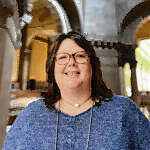Editor’s note: Faith columns reflect the views and opinion of the writer and not necessarily those of The Republic.
Recently, after a day working on the lawn and garden, I became aware that part of my face felt funny. High on my forehead where my cap fit snug against my temple, there was a little discomfort. I brushed my fingers against it and felt a bump.
Occasionally it seemed a little itchy, so I scratched at it. Later that evening I looked in the mirror and discovered the bump was now swollen, puffing out my left cheek and causing my left eyelid to droop.
What’s a guy to do? I showed it to my wife. Complained a little. Took some Benadryl, and went to bed.
By the next morning, the swelling extended across the top and down below my eye, making it difficult to hold my eye fully open. Weird. I still had no idea what had caused this new look. I did not remember being bitten by any insect, wondered if it was poison ivy, ruled out shingles, and resolved not to Google other possibilities.
Later in the day, I remembered that Jesus had something to say about folks who are having trouble with their vision.
Specifically he said, "Why do you see the speck in your neighbor’s eye, but do not notice the log in your own eye? You hypocrite, first take the log out of your own eye, and then you will see clearly to take the speck out of your neighbor’s eye." (Matthew 7:3-5 NRSV)
Jesus had a way with words, didn’t he? That particular saying did not win him any friends among the scribes and Pharisees.
But, coupled with my own temporary eye impairment, it got me thinking. One of the tragic side effects of the COVID-19 pandemic has been the need to distance oneself from others — especially those of other households. This was true in the pre-vaccination months, but even today we are repeatedly cautioned to maintain "social distance."
The trouble with such practice, reinforced over months and months, is that keeping one’s distance can lead to isolation, which can lead to myopia in lifestyle, which might result in self-centeredness. (You ever read the book "If You Give a Mouse a Cookie"? One thing does lead to the next!)
One of the social side effects of COVID-19 is the tendency it has awakened in us to critique our neighbor’s speckled vision when we’ve got lumber trouble in our own eyesight.
Why is this?
My faith teaches me that people need people. We were created to be in community. That often translates to a faith community, or to Jesus’ command to love your neighbor.
We are social creatures — even the most antisocial among us needs someone. And when we are able to come together and socialize, meeting unencumbered, face to face, there are certain norms of conduct that guide those interactions.
In short, we might see some specks on our neighbors eye glasses, but we would never comment on them.
Removed from face-to-face proximity, the norms seem to change. I’ve noticed over the last many months that persons have said and shared things via the distance of technology (social media, text, email) that they never would have face to face. It’s as though social distance has given permission for some of the norms to be abandoned. We are quicker to point out specks than ever before.
The current cultural-political divides are evidence of this. Unfortunately, what has been modeled at the highest levels, when it comes to vilification of others, has filtered down to workplaces, neighborhoods, PTA’s, faith communities and other forums of grassroots-level living.
Which brings me back to my temporarily impaired vision.
When your eye is swollen it’s hard to see past that. Your vision is a little blurry as you catch the shadow of eyelids, eye lashes, and squint through extra tears. After a day of this you want to go sit in the La-Z-Boy chair and close your eyes. It’s rather like coming to the end of a day of video calls, or screen work from home. Just about the last thing on your mind is your neighbor, unless of course that neighbor has done something that irks or annoys you just a bit.
The ability to move past such impairment and distortion in eyesight requires us to focus our vision beyond self again.
Jesus had things to say about this as well. When asked what is the greatest commandment, he replied: "Love the Lord your God with all your heart, and with all your soul, and with all your mind. (And) … love your neighbor as yourself." (Matthew 22:37-39 NRSV)
Could it be that in pointing us toward the love of others, and not just a love of self, that Jesus is revealing how we can deal with the log in our own eye, and graciously overlook the speck in another’s?
It seems that this ongoing time of pandemic is calling each of us to deploy what my sister sometimes calls "EGR" living. EGR stands for "extra grace required." Many of the self-help gurus have counseled this for self during these challenging days.
"Give yourself some grace. Don’t be too hard on yourself."
But what about applying that same generosity toward others?
Looking outward, not just inward, will improve the eyesight and vision of us all.
The Rev. Dan Cash is senior pastor at First Baptist Church in Columbus. This first appeared on his blog on the church website at firstbaptistcolumbus.org.




